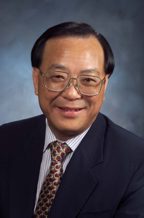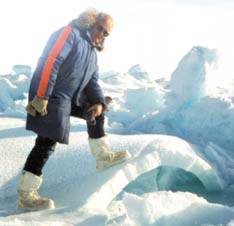 [At
leftt: Cheng-kong Chou. Photo supplied courtesy of LLNL.]
[At
leftt: Cheng-kong Chou. Photo supplied courtesy of LLNL.]

| News
about people and
announcements from AGI's 37 member societies ______________________ |
To post news in Society Page, send e-mail to geotimes@agiweb.org with the subject: Society Page. |
 [At
leftt: Cheng-kong Chou. Photo supplied courtesy of LLNL.]
[At
leftt: Cheng-kong Chou. Photo supplied courtesy of LLNL.]
"I look forward to coming back to the Laboratory and taking on this challenging role," Chou said. "This is a critical time for energy and environmental issues, not only in California but to the rest of the nation as well."
As associate director of Energy and Environment, Chou will oversee the Applied Energy Technologies Program, the Atmospheric Science Division, Fission Energy and Systems Safety, the Geosciences and Environmental Technology Division, the Geophysics and Global Security Division, Health and Ecological Assessment, and the lab’s role in the Yucca Mountain Project.
He will also oversee the Center for Accelerator Mass Spectrometry, the National Atmospheric Release Advisory Center and the Program for Climate Model Diagnosis and Intercomparison.
Since 1999, Chou has served on assignment to the directors of the offices
of Civilian Radioactive Waste Management, Nuclear Energy, and Nonproliferation.
Chou joined the Lab in 1978.
Ambassadors
for science
The U.S. Geological Survey (USGS) recognized 16 individuals and seven
organizations as "Ambassadors for Science" at its open house reception
in April. The honorees are people who use science in the public policy
arena and are close partners with the USGS. Following is a description
of some of the honorees and their contributions, as reported by the USGS
in April:
David Brezinski of the Maryland Geological Survey was recognized for his scientific expertise on Appalachian basin geology and his pragmatic approach to science that has enhanced the quality, value and timeliness of geologic hazards and mapping projects.
Margaret Leinen, director of the National Science Foundation's Geosciences Directorate, because "her guidance and her conversations have pushed scientists to consider the important issues and reminded them to be sure to reach out to the community."
Stephen Parker, director of the Water Science and Technology Board at the National Research Council, for his "significant contributions to science policy on a wide range of important national issues."
Don Ralston, senior advisor on research for the Bureau of Reclamation, for his enthusiastic support of technology transfer efforts across government. He has worked to ensure that the results of the USGS "do not languish on bookshelves, but that they are put into practice."
Some of the organizations the USGS recognized were:
The Board of Governors of the Federal Reserve System, or Federal Reserve Board (FRB), for demonstrating its commitment to the value of accurate scientific information and statistics by using such data as the basis for economic decision-making. A specific example is the Board's use of USGS minerals information to formulate capacity indexes used in mining and refining industries.
The International Lead and Zinc Study Group and the International Copper Study Group. Together the groups represent 90 percent of the world’s lead and zinc demand and 80 percent of the world's copper demand. These groups were honored for promoting market transparency, providing forums for dialog and enhancing cooperation between member governments.
The National Mining Association (NMA), for providing exemplary support for the use of science and minerals information in public and private decision-making. "It also provides valuable forums at which key decision-makers can gather and discuss minerals policy issues."
The National Stone, Sand, and Gravel Association for its effective
promotion of sound science in public policy and management.
Scout's honor
The District of Columbia Section of the Society for Mining, Metallurgy
and Exploration gave its 2000 Herbert Hoover Award to Alma Hale Paty, who
runs her own consulting company, A Capital Resource.
The section recognized her support of its operations and mineral education
activities. She currently serves as the chair of the section's GEM (Government,
Education and Mining) Committee. Her efforts helped the D.C. Section to
win the SME's National GEM award at the society's annual meeting in Denver
in February.
 Paty spearheaded
GEM's efforts to educate the public about society's use of minerals and
is often seen handing out rock and mineral kits for local earth science
teachers, talking with Cub and Brownie Scouts and giving talks on minerals
and rocks at the Smithsonian Institution National Museum of Natural History.
Paty spearheaded
GEM's efforts to educate the public about society's use of minerals and
is often seen handing out rock and mineral kits for local earth science
teachers, talking with Cub and Brownie Scouts and giving talks on minerals
and rocks at the Smithsonian Institution National Museum of Natural History.
Hummel leaves
SEG
Paul Hummel resigned March 31 from his position as executive director
of the Society of Exploration Geophysicists. After serving SEG for seven
years, Hummel decided to return to the West Coast to live closer to family
and pursue new opportunities, SEG announced in May.
National
Academy scientists
The National Academy of Sciences announced May 1 that it elected 72
new members and 15 foreign associates from 10 countries to recognize their
distinguished and continuing achievements in original research. Below are
the newly elected members involved in earth science and geosciences.
Permission
to board
The Graduate School of Oceanography at the University of Rhode Island
will welcome a new dean to the Narragansett Bay Campus this fall.
 David Farmer
is a member of the American Geophysical Union and formerly the head the
Acoustical Oceanography Group he created at the Institute of Ocean Sciences
in Sidney, British Columbia.
David Farmer
is a member of the American Geophysical Union and formerly the head the
Acoustical Oceanography Group he created at the Institute of Ocean Sciences
in Sidney, British Columbia.
[At leftt: David Farmer used measurements of naturally occurring sound to investigate the mechanics of sea ice. Photo supplied courtesy of Farmer.]
He will succeed Margaret Leinen, who was named director of the Geosciences Directorate at the National Science Foundation last January. Professor James Yoder has served as interim dean since Leinen's departure.
A native of the United Kingdom, Farmer received bachelor's and master's degrees from McGill University and a doctorate from the University of British Columbia. He has a particular interest in the application of acoustical techniques to ocean research and has explored their use in topics ranging from the measurement of ocean surface bubbles to the fracturing of sea ice.
He is a Fellow of the Royal Society of Canada (Canada's national academy) and the recipient of the President's Prize from the Canadian Meteorological and Oceanographic Society.
He has also received the Walter Munk Award from The Oceanography Society
and Office of Naval Research, and the Rosenstiel Award from the University
of Miami's Rosenstiel School of Marine and Atmospheric Science.
 |
Geotimes Home | AGI Home | Information Services | Geoscience Education | Public Policy | Programs | Publications | Careers |